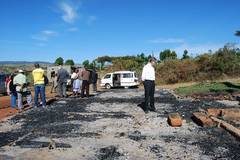Reflections by Dr Geeske Zanen

Members of the WCC Living Letters team along with staff of the National Council of Churches in Kenya inspected destroyed property in the Rift Valley's Molo district, near the Nakuru city.
Dr Geeske Zanen, a World YWCA board member from the Netherlands, was part of the Living Letters solidarity team sent to Kenya by the World Council of Churches (WCC) from 30 January to 3 February 2008.
Read her personal reflections on this experience:
Being already in Kenya before the elections, I was fully aware of the situation of the post election violence, but the opportunity to be able to gain more first hand knowledge has really inspired and challenged me.
I am inspired by the prayers we held with all the different people, from the political leaders to the grass roots we have met. The solidarity within these prayers was well understood. Since the church in Kenya is not a place to cry and to pray together at this moment, I was happy that the Living Letters delegation was able to pray in the different environments, no matter who was in front of us. The challenge for the church leaders to repair their neutral status is huge, but by speaking out this challenge and bringing church leaders together the first steps are made. By the Living Letters visit, the National Council of Churches is encouraged to work even harder on the division within the churches and the necessity of the role of church leaders in the process of healing and reconciliation. It will be a challenge to include all the different churches, but also the different religions in this process. For me this visit is a trigger to attend different churches in Kenya and talk with the church leaders about their role in peace building.
The people who shared their raw anger and pain with us touched me deeply, but also inspired me. Although they destroyed others property for revenge, they experienced sexual violence, they have lost their relatives or they were ashamed of their own community, they shared their feelings and spoke with us about the future of Kenya. The issues raised have deep roots and a long history and it is clear that the land issue should be solved in the coming time, next to equal access to resources and a new constitution. The challenge to turn the negative energy of the youth into positive energy to build a peaceful society is of high importance, but it is wonderful to see that new youth leaders step forward and good initiatives have been started. The Living Letters visit alone is not enough for me to add my share in the peace building process. The new relations I have started with some of them challenge me to let them feel heard, to give moral support and to encourage them in the good work they are doing.
I was challenged not to feel angry at the government about the lack of justice and security in the country, the lack of care for their people and their hunger for power, but to speak with them openly about the importance of the role of the churches in the mediation and the peace building process. Nyaradzai impressed me in the way she addressed the problems women and children were facing to the politicians in a constructive manner. I was inspired by the historical overview of the conflict by the opposition leaders to see the issues raised in a larger framework. I hope that the Living Letters delegation challenged the political leaders to work at the future of Kenya, despite their personal interests.
I am even more challenged to put the women's agenda on the table. During this conflict, but also during the mediation the women's voices were missing. Young women didn't get the change to speak in the communities and women church leaders were missing during our visit. During our visit it was clear that women and children are most vulnerable and that the security was insufficient. It is sad to see that for instance lactating women or women living with HIV/AIDS were facing even more problems by lack of access of equipment and medication. I am proud at the initiative of the YWCA to give the Living Letters delegation a better insight in the issues raised by different women leaders. I have learned that women have responded on the humanitarian issues in first instance, but that it is of high importance to start working on the healing and peace building within their families, their communities and their country.
I am happy I was able to share my impressions and thoughts of the situation in Kenya before and after the elections with the Living Letters delegation and I am inspired by the other delegation members in the way they were contributing to the visit in their own way. The international solidarity we have brought is important for the once we have met and the World Council of Churches can build on this contacts in the near future. We have gained more insight in the conflict and in the way different groups and people started with overcoming violence. Unless my active participation in the delegation, I felt sometimes that it was not enough to come for solidarity and prayers. My challenge is to use my energy in a way that the people I have met feel encourage to work on the long-term peace process in Kenya.
Many impressions will stay with me forever and have deepened my relation with the Kenyans and with Kenya. I will never forget my reaction when I found out that on the way back to Kisii half of Sotik had disappeared and I will never forget the youth in Kibera who are full of energy to make a change in their lives. Thank you of being part of the Living Letters delegation and thank you to the group of the National Council of Churches Kenya, which has organised the visit.
More information on the Living Letters visit to Kenya
National Council of Churches in Kenya
Background information on the Living Letters visits



